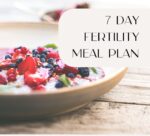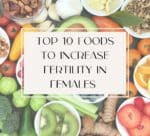foods to avoid after an embryo transfer: Nourishing Your Fertility Journey
In this article, we’ll discuss which foods to avoid after an embryo transfer. As you likely already know, any fertility journey that includes an embryo transfer has been a long and likely exhausting one. Because of this, an IVF process marks a significant step towards becoming parents. So, now that you are here, let’s talk about how you can maximize your time, money, effort, and energy, to help increase your chances of a successful transfer and pregnancy.
Understanding the Importance of Nutrition Post-Embryo Transfer
While preparing for any procedure, being healthy before it happens helps achieve improved results. So, after embryo transfer, your body undergoes numerous changes as it prepares to nurture and support the implanted embryo. Therefore, proper nutrition during this critical period is important. Learning which foods to avoid and which to include can positively impact your outcome. Focus on nourishing, wholesome foods is crucial, and avoiding certain items is equally important, to create an optimal environment for the embryo to thrive. Consequently, this list is all about knowing which foods to avoid to help you have the best possible support for the embryo during these early stages.
what to Avoid After Embryo Transfer
Beverages
First, while many food items should be avoided after an embryo transfer, let’s start with some not-so-obvious beverages to avoid.
- Caffeine: Limiting or avoid caffeine after an embryo transfer can be important. To expand on that, the quantity of caffeine intake during conception is controversial. Some studies say that it may impact blood flow to the uterus, potentially affecting implantation. However, some studies report no impact at all. Because of this, I recommend that you avoid caffeinated beverages and instead, opt for water, dairy, decaffeinated beverages, or certain types of herbal teas.
- Alcohol: As you likely are already aware, it is highly recommended to avoid alcohol during conception, after an embryo transfer, and throughout pregnancy. It can do many things to the body and one of them is disrupting hormone levels and impairing the body’s ability to support a healthy pregnancy. This is why it is best to abstain from alcohol entirely during this crucial phase.
- Energy Drinks: These beverages contain many ingredients that do not support embryo growth and development, which is why they are on the avoid list. Moreover, researchers have not studied the safety of many of these ingredients during conception. Therefore, it is best to avoid them. Alternatively, if you feel fatigued and need an energy boost, try things like drinking more water, getting more sleep, or stress-relieving activities. Additionally, incorporating healthy habits can significantly benefit your overall well-being during this crucial phase.
- Certain Herbal Teas: Some herbal teas contain ingredients that can trigger uterine contractions or irritation. These include licorice root tea, ginseng tea, parsley tea, sage tea, and red raspberry leaf tea. Also, avoid diet, detox, or cleansing teas during this time.
What to avoid after an embryo transfer
foods
High-Mercury Fish: Mercury, found in certain fish like shark, swordfish, king mackerel, and tilefish, can harm fetal development.
Raw or Undercooked Foods: To minimize the risk of foodborne illnesses, avoid raw or undercooked meats, eggs, and unpasteurized dairy products. For example, cheese like brie, camembert or blue cheese made from unpasteurized dairy can increase your risk of foodborne illness. Ensure that all foods are thoroughly cooked, and pasteurized (as required). To add to that, ensure refrigerated foods are kept cold until consumption.
Ultra-Processed Foods: To be clear, avoid foods high in refined sugars, artificial additives, and foods that generally do not look like their original source. This is because these foods are linked to inflammation and hormonal imbalances, potentially affecting implantation. Examples include protein bars, powdered proteins, and confectionary goods like candy and gummies.
Trans Fats: You can’t make trans fats in your kitchen. First, the best way to avoid trans is to read the labels of your pantry and freezer items. Second, take a peek at the ingredient list and ensure to avoid hydrogenated or partially hydrogenated ingredients.
Red Meat: Studies show that a high intake of red meat, such as beef, lamb, goat, or pork, post embryo transfer has decreased implantation rates and the likelihood of pregnancy.
High Sugar Foods and Added-Sugar Foods: These foods include candy, confectionary, bars, commercially baked cookies, pastries and more. With added sugars and commonly, trans fats, these foods are considered pro-inflammatory. Try instead fruits, homemade baked goods and/or dark chocolate nuts.
Summary
In conclusion, being mindful of your dietary choices post-embryo transfer can significantly impact your fertility journey’s success. By avoiding caffeine, alcohol, high-mercury fish, processed foods, raw foods, and certain beverages, you create a supportive environment for embryo implantation and early pregnancy development.
For personalized guidance on fertility nutrition and support throughout your journey, visit my booking page to connect with me. Let’s work together to nourish your body and nurture your dreams of parenthood.
References:
- American Society for Reproductive Medicine. (2020). Caffeine, Alcohol, Smoking, and Pregnancy.
- Harvard T.H. Chan School of Public Health. (2022). Mercury Levels in Fish: Information for Pregnant Women and Parents.
- U.S. Food and Drug Administration. (2023). Food Safety for Moms-to-Be: Once Baby Arrives.
- Braga DP, Halpern G, Setti AS, Figueira RC, Iaconelli A Jr, Borges E Jr. The impact of food intake and social habits on embryo quality and the likelihood of blastocyst formation. Reprod Biomed Online. 2015 Jul;31(1):30-8. doi: 10.1016/j.rbmo.2015.03.007. Epub 2015 Mar 27. PMID: 25982093.
- Sanderman EA, Willis SK, Wise LA. Female dietary patterns and outcomes of in vitro fertilization (IVF): a systematic literature review. Nutr J. 2022 Jan 18;21(1):5. doi: 10.1186/s12937-021-00757-7. PMID: 35042510; PMCID: PMC8764863.





Leave a Reply
You must be logged in to post a comment.